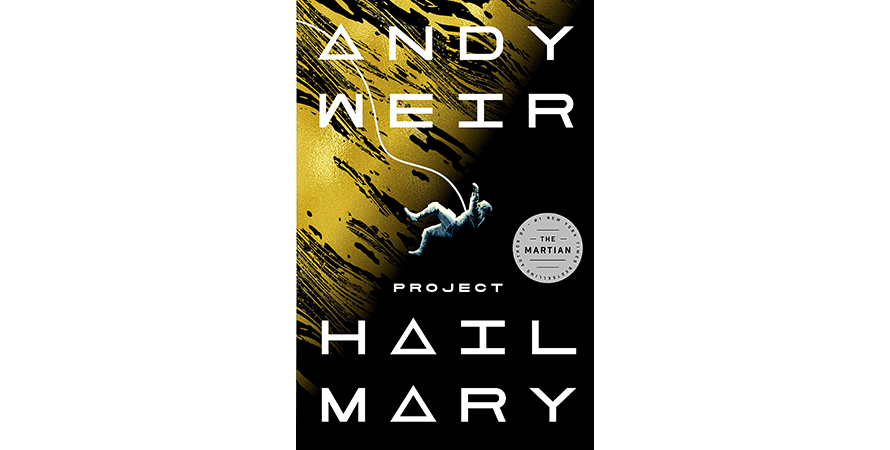
Another favorite for the Science Fiction Community!
This review by The National Space Society says it all!
Few science fiction authors have enjoyed as spectacular a debut as Andy Weir had with The Martian. He followed that novel with a very different and equally good novel about the Moon, Artemis. Now, with Project Hail Mary, he skips the rest of the solar system and heads straight out for interstellar space.
A man awakens in a small room, with no memory of where he is, or even of his own name. His first discovery is the mummified bodies of two other people on beds in the same room. He is attended by a helpful but initially uninformative computer. Slowly he remembers/discovers that he’s an astronaut named Ryland Grace, onboard the first human starship; he and his now-deceased crewmates were put into medically-induced comas to conserve their life support supplies (and their sanity) on a years-long high-sublight-speed voyage to Tau Ceti. They were sent on this trip in a desperate attempt to find a solution to a problem that will end life on Earth if they fail.
It turns out that our first encounter with extraterrestrial life is not with an alien intelligence, but with an alien microbe that has arrived in our solar system and started eating the sun. Gradually, but with increasing speed, the sun is getting colder. And so are all the nearby stars – except Tau Ceti. All life on Earth will be extinguished within a generation unless we can figure out what makes Tau Ceti different.
This story is set in the present day, so humans don’t have interstellar propulsion yet, but the astrophage, as the alien microbe is named (by Grace, a schoolteacher and former astrobiologist who got in on the beginning of research on the bug, which is why he’s on the ship), consumes and stores solar energy, which makes it a super-efficient fuel as well as an existential threat. A crash program sends the Hail Mary on its way to investigate Tau Ceti and send the answer home before it’s too late.
For Grace, assuming he does manage this alone, there’s only one problem: the ship doesn’t have enough astrophage fuel to get home. It’s a one-way trip, and he’ll die when his food and oxygen run out.
And then he meets an alien, an intelligent alien, like himself but for different reasons the sole survivor of a crew sent out to investigate….
As the two survivors team up, they find they are well matched: Grace is a biologist and “Rocky” is an engineer who can make and fix almost anything. There are a lot of things to be made and fixed. Many science fiction novels are more appropriately labeled technology fiction, and there’s plenty of engineering on display here, but that’s all in support of the scientific puzzle-solving. The plot intensifies as solutions create new and bigger problems, and a friendship is literally forged in fire.
The trademark wisecracking wit of the protagonists in Weir’s earlier books is still there, but dialed way back – appropriately so; the potential end of all life on Earth is no laughing matter. Also suppressed is the huge number of four letter Anglo-Saxon profanities that were so distracting in his earlier novels. In fact, Grace is so mild in his speech that sometimes it almost seems as if Weir were mocking the “prudes” (count me as one) who found his earlier dialogue so over the top as to take away from his storytelling.
I’ll be looking forward to the movie.
Even the best authors will have a mediocre novel eventually, but Weir has yet to produce one. Readers of science fiction that care about both science/technology and people will find that Weir has come through, magnificently, yet again.
© 2021 Clifford R. McMurray
The soft girl movement
The soft girl movement, like many cultural trends, is likely...
Read MoreZarya Episode II: Sochi Unleashed
In ‘Zarya Episode II: Sochi Unleashed’, the barrier between artificial...
Read MoreZarya Episode II – Draft 1
Chapter 1 It felt like everything was a dream at...
Read MoreHouse of Mystery
Author Jackiem Joyner featured on NBC’s House of Mystery New...
Read More
